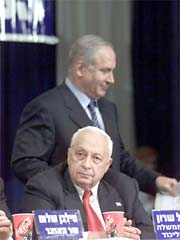
Benjamin Netanyahu
Born: 10/21/1949
Birthplace: Tel Aviv, Israel
Son of a history professor, and a leader of the conservative Revisionist movement, Netanyahu moved to the United States in 1963. He returned to Israel in 1967 to serve in the military. From 1967–72 he was part of an elite commando unit that successfully stormed a highjacked airplane at Ben-Gurion airport in 1972. He then returned to the United States to study at MIT, leaving in 1973 to fight in the Yom Kippur war, and returning to MIT to complete his MBA after the war.
When his brother was the only military casualty of the raid on Entebbe in 1976, Netanyahu responded by founding an anti-terrorism institute. He worked for several years as a marketing manager before accepting a position with Moshe Arens, the Israeli ambassador to the U.S. His political activities continued with posts as permanent representative to the United Nations (1984–88) and deputy minister of foreign affairs (1988–91). He was elected to parliament in 1988 and gained control of the Likud party in 1993. He was narrowly elected Prime Minister in 1996.
A 1998 summit at Wye Mills, Md., generated the first real progress in the stymied Middle East peace talks in 19 months. Netanyahu and Palestinian President Yasir Arafat settled several important interim issues called for by the 1993 Oslo Peace Accords. The Palestinians agreed to remove language from their founding charter that called for the dismantling of the Jewish state; Israelis agreed to cede an additional 13% percent of the West Bank. Netanyahu found himself attacked from both sides of the political spectrum—the left accused him of intentionally thwarting the peace process and the right accused him of betrayal, having elected him in the belief that he would never give up Israeli territory. Even though Netanyahu reneged on the second Israeli withdrawal, scheduled for Dec. 18th, by then he had irreparably alienated his right wing base. In mid-December Parliament voted to dissolve Netanyahu's government and hold elections in the spring, putting the peace negotiations on hold. Netanyahu was defeated in the 1999 election and resigned his chairmanship of the Likud. In Nov. 2002, he was appointed Israel's Minister of Foreign Affairs, and in Feb. 2003, he became Minister of Finance.
In 2005, following Ariel Sharon's resignation ...






